Tyler Cowen’s been doing an odd thing for the past year where he says he supports more expansionary monetary policy while regularly criticizing calls for more expansionary monetary policy and rarely, if ever, expressing distress at the plight of millions of unemployed workers and their families around the world suffering needlessly due to unnecessarily tight money.
Today he offers his reasons:
A bit more personally or perhaps psychologically, the contrarian in me gets nervous when I read the ongoing ritual excoriation of Ben Bernanke in the blogosphere, every time the Fed decides to take no further major action.
This seems to me like a strange reading of the landscape. On one team are the leaders of the Federal Reserve, the European Central Bank, the Bank of Japan, and the Bank of England. Alongside them are the political leaders of the United States, Germany, Japan, and England along with the main opposition parties in all of those countries. The Bank of International Settlements wants tighter money. Every few months Brazilian politicians pop up to complain about “currency wars.” And then on the other side you have … a handful of economics bloggers.
Everyone’s entitled to be as contrarian as they like, but I think that if you’re siding with all the relevant decision-makers then you’re not really being much of a contrarian.
It seems to me that even in circles that are favorable to looser money, I read much too much personal sympathy for Ben Bernanke on the grounds that he’s an official member of the Smart Economist’s Cool Kids Club. People seem to put a lot of time into explaining the political pressures and constraints he’s under, as if we’ve completely forgotten the decades-long conventional wisdom in which there was thought to be an inherent inflationary bias to monetary policy that had to be combatted with strict policies of central bank independence. Whether or not that was a good idea, the impact of central bank independence is to put an awesome level of power and responsibilites onto the shoulder of the Federal Reserve Chairman. The moral stakes are high. Nobody forced Bernanke to take the job. Sharp business cycle downturns lead to, among other things, large spikes in suicide rates. Lets explain to those families about the difficulties central banks face in making credible commitments.
